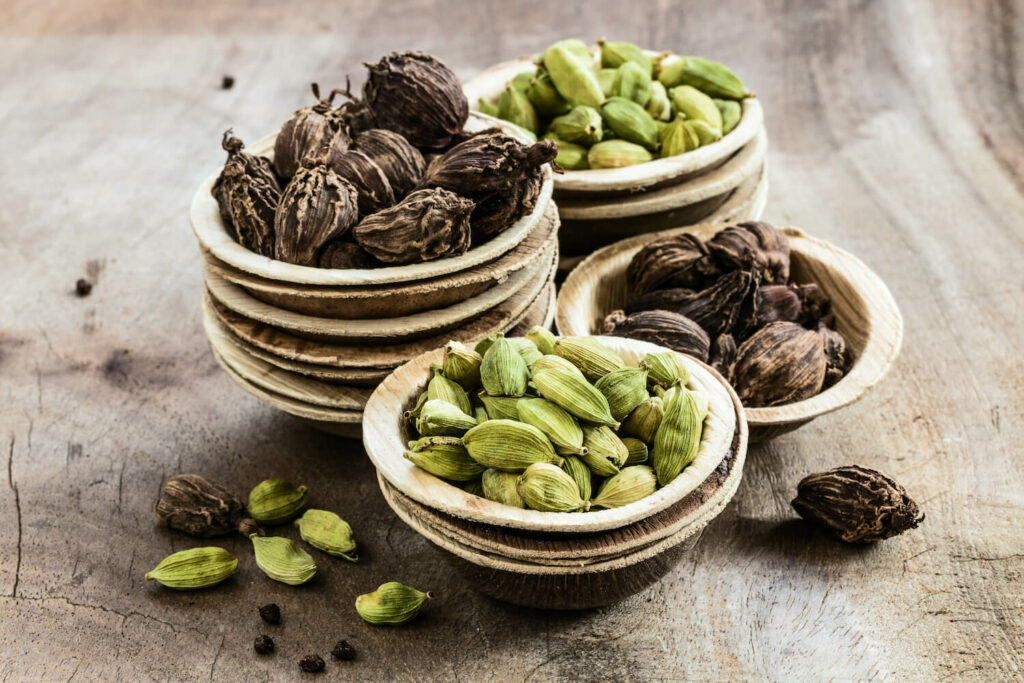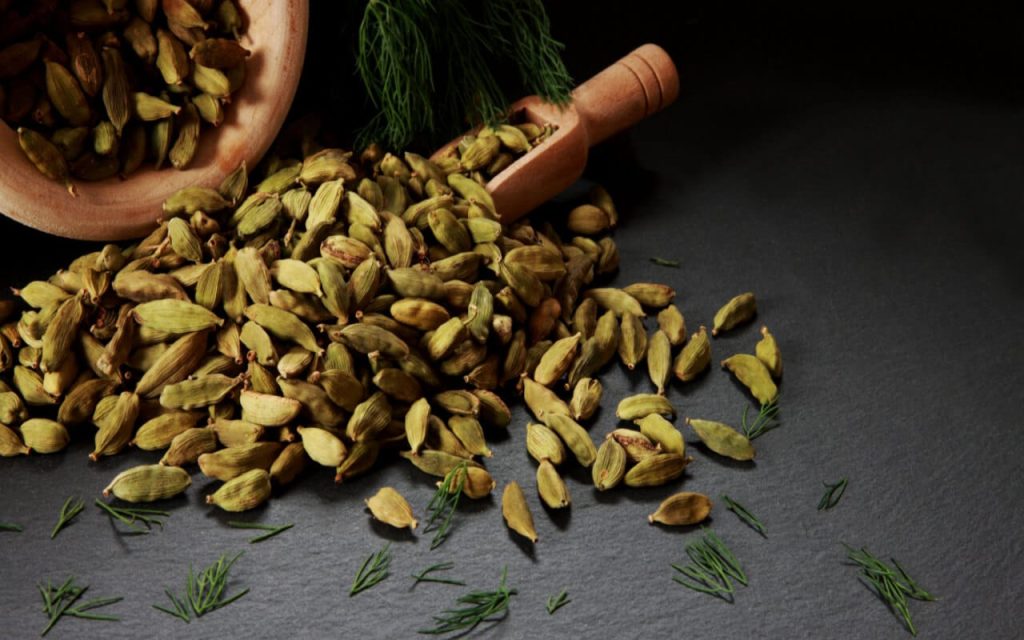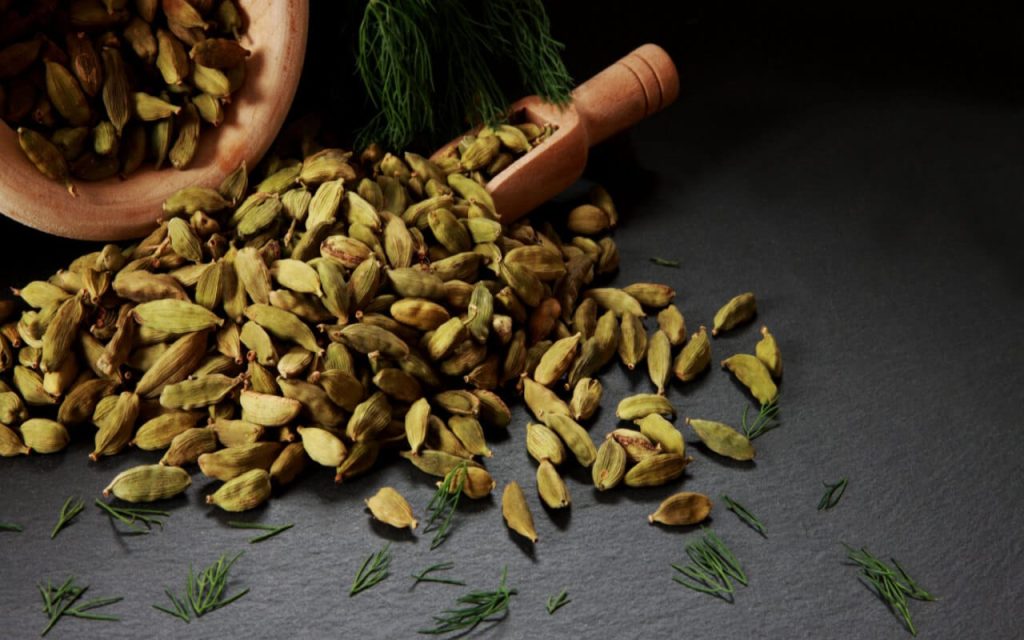
Cardamom, often referred to as the “Queen of Spices,” holds a special place in the ancient Indian system of medicine known as Ayurveda. This fragrant spice, derived from the seeds of the Elettaria cardamomum plant, has been used for thousands of years for its culinary value and its therapeutic properties. Ayurveda, which emphasizes a holistic approach to health and wellness, regards cardamom as a powerful herb that can balance the body’s doshas (vital energies), enhance digestion, detoxify the body, and promote overall well-being.
Cardamom is a perennial herb that grows in the tropical regions of India and other parts of Southeast Asia. Known for its aromatic seeds, cardamom is a key ingredient in traditional Indian cuisine and Ayurvedic medicine. In Ayurveda, cardamom is classified as a “tridoshic” herb, which is beneficial for balancing all three doshas: Vata, Pitta, and Kapha.
- Vata represents the elements of air and ether and is associated with movement and communication.
- Pitta embodies the elements of fire and water, governing metabolism and transformation.
- Kapha is associated with the earth and water and is responsible for structure, lubrication, and stability.
Cardamom’s ability to balance these doshas makes it a versatile remedy in Ayurvedic practice. It is primarily known for its ability to stimulate digestion, cleanse the system, and improve respiratory health.
What are the key health benefits of cardamom according to Ayurveda?
According to Ayurveda, cardamom offers several key health benefits. It enhances digestion by stimulating the digestive fire (Agni) and relieving gas and bloating.
Cardamom is a powerful detoxifier, helping to eliminate toxins (ama) from the body. It supports respiratory health by clearing mucus and easing breathing in conditions like asthma.
Cardamom also promotes mental clarity, reduces stress, and improves oral health by combating bad breath and oral infections. Additionally, it supports cardiovascular health by lowering blood pressure and improving circulation.
Its tridoshic nature makes it beneficial for balancing all three doshas—Vata, Pitta, and Kapha.
How does Ayurveda recommend using cardamom for digestive issues?
Ayurveda recommends using cardamom to alleviate digestive issues by adding it to daily meals or preparing it as tea. You can chew cardamom seeds after meals to reduce bloating, gas, and indigestion.
To stimulate digestion, Ayurveda suggests boiling a few crushed cardamom pods in water to make tea, which can be consumed before or after meals.
Mixing cardamom powder with honey is another remedy for soothing the stomach and easing digestion. Its warming properties help to balance digestive fire (Agni), promoting better nutrient absorption and reducing discomfort in the gastrointestinal tract.
Can cardamom help in balancing the doshas in Ayurveda? If so, how?

Yes, cardamom is highly regarded in Ayurveda for its ability to balance the three doshas—Vata, Pitta, and Kapha—due to its unique combination of properties.
Vata Dosha: Cardamom helps to balance Vata dosha by its warming nature, which counteracts the cold and dry qualities of Vata. It aids in digestion, alleviates gas, and soothes the nervous system, making it beneficial for those with Vata imbalances, which often manifest as anxiety, bloating, or restlessness.
Pitta Dosha: Despite its warming quality, cardamom is also cooling and soothing, making it effective in balancing Pitta dosha. It helps reduce excess heat in the body, alleviating symptoms like acidity, inflammation, and irritability. Its sweet and slightly bitter flavor pacifies the fiery nature of Pitta, promoting a calm and balanced state.
Kapha Dosha: For Kapha, cardamom’s warming and stimulating properties are beneficial in reducing excess Kapha, which is characterized by sluggishness, congestion, and heaviness. Cardamom helps to clear mucus, improve circulation, and stimulate metabolism, making it an excellent remedy for respiratory issues and digestive sluggishness associated with Kapha imbalance.
Cardamom’s versatile properties make it a powerful ally in Ayurveda for balancing all three doshas, supporting overall health and well-being.
What role does cardamom play in Ayurvedic treatments for stress and anxiety?

In Ayurveda, cardamom plays a significant role in alleviating stress and anxiety due to its calming and soothing properties. It is considered a “Sattvic” herb, which means it promotes mental clarity, peace, and a balanced state of mind. Sattvic foods and herbs are known to enhance positive mental states and are highly valued in Ayurvedic practices for their ability to support emotional well-being.
Cardamom’s sweet and mildly spicy aroma has a natural uplifting effect on the mind, helping to reduce stress and anxiety. It can help pacify the Vata dosha, which, when imbalanced, often leads to feelings of anxiety, restlessness, and nervousness. By balancing Vata, cardamom helps to calm the nervous system, reduce mental agitation, and promote a sense of relaxation.
In Ayurvedic treatments, cardamom is often used in teas or added to warm milk with a pinch of saffron and a natural sweetener like honey. This combination not only soothes the digestive system but also nourishes the mind, helping to ease stress and promote better sleep. Additionally, cardamom can be used in aromatherapy by inhaling its essential oil, which further enhances its calming effects and helps to alleviate feelings of anxiety and tension.
How does cardamom contribute to maintaining oral health according to Ayurveda?
Antibacterial Action: Cardamom’s essential oils have antimicrobial properties that help combat oral bacteria, reducing the risk of infections and maintaining oral hygiene.
Mouth Freshener: Chewing cardamom seeds neutralize bad breath and leave the mouth feeling fresh due to their pleasant aroma and natural sweetness.
Anti-inflammatory Effects: Its anti-inflammatory properties soothe gum inflammation and discomfort, promoting healthy gums.
Digestive Support: By aiding digestion and reducing acid reflux, cardamom indirectly benefits oral health by minimizing acid-related dental issues.
What are the potential side effects of using cardamom in Ayurvedic practices?

While cardamom is generally safe and beneficial for most people, excessive use can lead to potential side effects. Here are some considerations:
- Digestive Discomfort: In large amounts, cardamom may cause digestive issues such as nausea, vomiting, or stomach upset. It is important to use cardamom in moderation to avoid these adverse effects.
- Allergic Reactions: Some individuals may be allergic to cardamom, experiencing symptoms such as itching, rash, or swelling. If you have a known allergy to spices or herbs, consult with a healthcare provider before using cardamom extensively.
- Interaction with Medications: Cardamom may interact with certain medications, including anticoagulants and antihypertensives. Its blood-thinning properties could potentially enhance the effects of these drugs, increasing the risk of bleeding or low blood pressure. Always consult with a healthcare provider if you are on medication.
- Gastrointestinal Issues: High doses can exacerbate conditions like acid reflux or gastritis in some individuals due to its warming effect.
- Pregnancy Concerns: While moderate use is generally considered safe, pregnant women should consult with their healthcare provider before using cardamom in large amounts to ensure it does not affect their pregnancy.
Overall, using cardamom in moderation and consulting with a healthcare professional can help mitigate these potential side effects.
Conclusion
Cardamom is a valuable herb in Ayurveda, renowned for its multifaceted benefits that enhance overall well-being. Its ability to balance the doshas—Vata, Pitta, and Kapha—makes it a versatile remedy for various health concerns.
Cardamom aids in digestion, detoxifies the body, support respiratory health, and contributes to mental clarity and oral hygiene. Its therapeutic properties extend to managing stress and anxiety, promoting cardiovascular health, and enhancing sexual vitality.
However, despite its numerous benefits, it is crucial to use cardamom in moderation to avoid potential side effects such as digestive discomfort, allergic reactions, or interactions with medications.
Consulting with a healthcare provider can help ensure that cardamom is used safely and effectively, particularly if you have underlying health conditions or are on medication.
Incorporating cardamom into your daily routine, whether through culinary use, teas, or as part of Ayurvedic treatments, can significantly support your health and balance.
Its ancient wisdom and modern scientific validation underscore its role as a valuable addition to holistic health practices. Embracing cardamom’s benefits, while being mindful of its usage, can contribute to a harmonious and healthy lifestyle in alignment with Ayurvedic principles.
